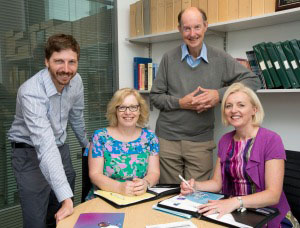 A method for parallel assembly of a large number of peptide-therapeutic cargo combinations, developed by Mike Gait’s group in the LMB’s PNAC Division, has been licensed to Cambridge Research Biochemicals (CRB). The company aims to launch a service in October to provide both researchers and pharmaceutical companies with custom-made libraries of peptide-cargo conjugates to help accelerate the delivery and development of new therapeutics.
A method for parallel assembly of a large number of peptide-therapeutic cargo combinations, developed by Mike Gait’s group in the LMB’s PNAC Division, has been licensed to Cambridge Research Biochemicals (CRB). The company aims to launch a service in October to provide both researchers and pharmaceutical companies with custom-made libraries of peptide-cargo conjugates to help accelerate the delivery and development of new therapeutics.
Researchers in the Gait group have been working to develop cell-penetrating peptides capable of carrying therapeutic drug cargoes into cells. The sorts of diseases that could benefit from such peptide-delivered therapeutics are broad ranging and include muscular dystrophies, cancer and metabolic diseases. In order to develop such therapeutics, it is necessary to test a wide variety of peptide-cargo combinations to determine the optimal peptide for delivery of the drug cargo for the condition being treated. This new technology enhances the speed of the early stage drug screening process, and helps those without the necessary chemistry expertise to more rapidly prepare and test a much greater number of peptide-drug conjugates towards the delivery and development of potential novel therapeutics.
Cambridge Research Biochemicals (CRB) specialises in custom supply of research reagents, principally peptides and antibodies for medical research and the Pharmaceutical industry. CRB has a long-standing relationship with LMB, both from the formation of the company in 1980 to the ongoing supply contract for peptides and antibodies in place since 2010. This collaboration marks another accolade from the partnership.
The method was licensed to CRB by MRC Technology on behalf of the MRC. MRC Technology provides the MRC with technology transfer services.
Further references:
Mike Gait’s group page
MRC Technology
Cambridge Research Biochemicals